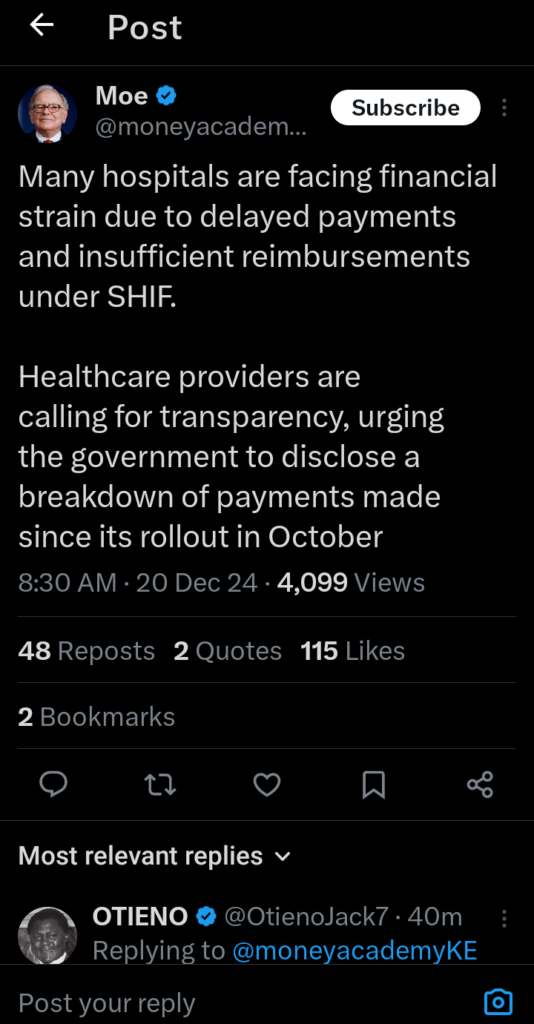Since its launch in October 2024, Kenya’s Social Health Insurance Fund (SHIF) has been mired in controversy, with numerous hospitals reporting financial distress due to delayed payments and inadequate reimbursements.
Healthcare providers are now demanding transparency from the government, urging the disclosure of detailed payment breakdowns to understand the allocation and management of funds within the system.
Additionally, nearly 90% of these hospitals are facing challenges in meeting payroll and supplier payments, while 75% are experiencing shortages in critical supplies, directly impacting patient care quality.
In November, the government announced the release of KSh3.7 billion to settle pending bills owed to various health facilities nationwide, including KSh1.4 billion for the defunct National Health Insurance Fund (NHIF).

However, healthcare providers report receiving only minimal amounts, insufficient to sustain operations.
Brian Lishenga, chairperson of RUPHA, stated, “Hospitals are being paid as little as KSh5,000, which is grossly insufficient.
If the government claims to have disbursed KSh3.2 billion, they should publish a breakdown of these payments.” The lack of transparency has led to growing frustration among healthcare providers, who are calling for the Ministry of Health to publish the names of hospitals that have been paid, along with the respective amounts.
This demand for transparency is not unique to Kenya; globally, there is a push for greater openness in healthcare financing to ensure accountability and efficient resource allocation.
For instance, in the United States, the implementation of the Physician Payments Sunshine Act requires medical product manufacturers to disclose payments made to physicians or teaching hospitals, aiming to increase transparency and reduce potential conflicts of interest.
The financial strain on hospitals due to delayed payments is not an isolated issue. In the United States, hospitals and health systems have reported sizable increases in delayed or missing payments, exacerbating financial challenges and impacting patient care.
The situation in Kenya underscores the critical need for transparent and efficient healthcare financing systems.
Without timely and adequate reimbursements, hospitals are unable to maintain operations, pay staff, or provide necessary medical supplies, ultimately compromising patient care.
The government’s reluctance to disclose detailed payment information further erodes trust between healthcare providers and policymakers, hindering collaborative efforts to improve the healthcare system.
The challenges faced by Kenyan hospitals under SHIF highlight the importance of transparency and accountability in healthcare financing.
The government’s failure to provide clear and timely reimbursements not only jeopardizes the financial stability of healthcare providers but also threatens the quality of care available to patients.
Addressing these issues requires immediate action to ensure that funds are disbursed efficiently and transparently, restoring trust and enabling healthcare providers to deliver essential services effectively.





















Add Comment